The 2020-21 European soccer season was a compact grind that produced some surprising results and offered all of us an opportunity to become experts in the field of soft-tissue injuries. It ended with Chelsea‘s Champions League final win over Manchester City, and while a lot of players have — or soon will — report to national teams for summer tournaments, whatever passes as an offseason has officially begun.
Ahead of immersing ourselves in international competitions, however, let us set the table for the 2021-22 club season. Who is most well-positioned for success? Who has the biggest questions to answer in the transfer market?
Jump to: Champions League | English Premier League | German Bundesliga | Spanish La Liga | Italian Serie A | French Ligue 1
Champions League
Before we dive into each of Europe’s Big 5 leagues, let us consider the teams most likely to be the best in Europe moving forward. The first table shows FiveThirtyEight’s Top 15 — most of which tried to start a Super League just a few weeks ago, as well as three German clubs, PSG and the ever-watchable Atalanta — ranked in order of their full-season expected goal (xG) differential in league play.
That obviously includes matches as far back as September, and quite a bit has changed since then. In the second table, the same clubs feature but the numbers refer only to play since Feb. 1, when the winter transfer window closed (and, conveniently, about when Chelsea hired Thomas Tuchel to replace Frank Lampard).
Adjusting for league strength, you could say that when Chelsea’s finishing was up to snuff — which it certainly wasn’t in every match — the Blues were the best overall team in Europe down the stretch, and not only in Champions League knockout play.
Stuck in ninth place in the Premier League when their managerial change took place, the Stamford Bridge club charged back to snare fourth place and, of course, won the biggest crown in club soccer. Not a bad first four months in charge for the German.
Chelsea will likely look for extra finishing ability over the summer, but some of the other clubs atop that second list are in transition.
Bayern, for example, is undergoing serious remodeling in the back and bringing in new manager Julian Nagelsmann, RB Leipzig has been raided: Nagelsmann and defender Dayot Upamecano are leaving for Bayern, defender Ibrahima Konate is joining Liverpool.
Elsewhere, Italian champion Inter is cutting major costs, plus manager Antonio Conte has departed by mutual consent. Meanwhile, two storied clubs, Barcelona and Juventus, are looking to both alleviate debt while building on teams that probably weren’t as bad as their respective records.
Uncertainty elsewhere likely means that this season’s two Champions League finalists will, perhaps along with 2020 champion Bayern, begin next season as Champions League favorites.
English Premier League
For each of Europe’s Big 5 leagues, let’s look at last season’s hierarchy and where things were shifting later in the campaign. We start with the league that has produced five of the past eight Champions League finalists.
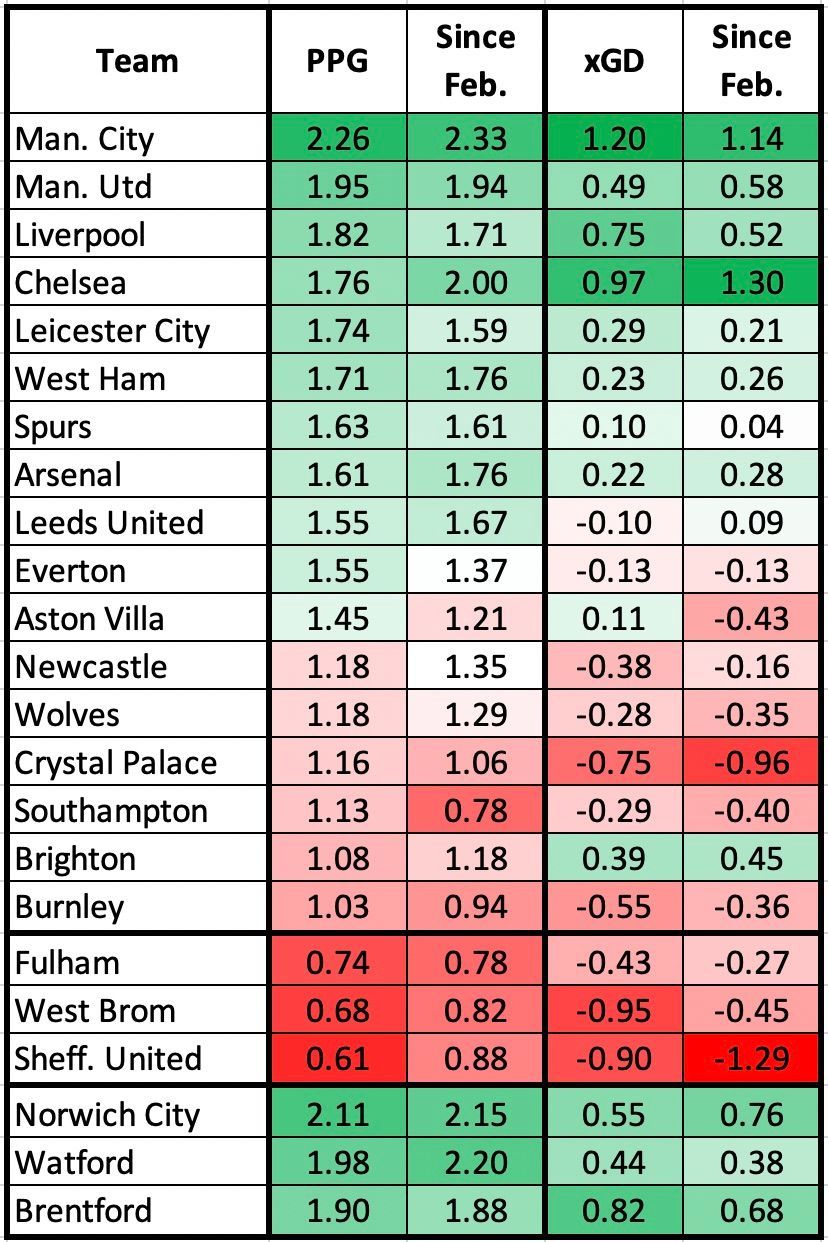
What happens now that Tuchel gets an offseason?
Chelsea proved the value of margin for error this season. Spending big when others were tightening purse strings, the Blues didn’t quite get what they were hoping for out of attackers Timo Werner, Kai Havertz and Hakim Ziyech, but goalkeeper Edouard Mendy settled an unsettled position, defenders Ben Chilwell and Thiago Silva were strong (especially for Tuchel), and Havertz’s first Champions League goal was a title winner.
– Stream ESPN FC Daily on ESPN+ (U.S. only)
A ninth-place team becoming the best in Europe within four months, simply with a managerial change (and yes, the return of midfielder N’Golo Kante to full health), isn’t supposed to happen, but Chelsea had all the ingredients its new chef needed.
So what more does Tuchel actually need beyond some extra assistance in the finishing department? Who leaves? Chelsea is in the ultimate position of luxury, but the moves made will be awfully informative.
Liverpool’s outlook after some recovery time
After losing almost every possible center-back on the roster to long-term injury and falling into a massive February funk, the defending league champion was in eighth place, eight points back of the top four, on March 14. It then pulled out 26 of a possible 30 points in the last 10 matches and salvaged a Champions League spot on the final day of the season.
A year ago, we were wondering how Liverpool would continue to contend while replenishing a roster of players that was beginning to drift past its collective peak. Now, after a season-long high-wire act, the Reds can get back to said replenishing.
Who else might be added to the attack besides September addition, Diogo Jota? What are the midfield plans now that Georginio Wijnaldum is off to Barcelona? And with Virgil van Dijk, Joe Gomez and Joel Matip all returning from injury, Nat Phillips looking brilliant late in the season and Konate on his way from Leipzig, what does the Liverpool defense of the future actually look like?
There’s a lot to unpack at Anfield, and the right answers could make Liverpool a contender again sooner than later.
1:17
Craig Burley doesn’t mince his words after Manchester United’s Europa League final defeat to Villarreal.
How do you fix Manchester United’s lack of urgency?
Ole Gunnar Solskjaer has mastered the late-game charge patented by his mentor and United legend, Sir Alex Ferguson: The Red Devils were the best in England, and one of the best in Europe, when they were behind and in need of a comeback, boating a league-leading 0.97 goal difference per 90 possessions when trailing (of their rivals, only West Ham — 0.95 — had a mark anywhere close).
This is the ultimate doubled-edged sword, though, because to shine when you behind, you must first fall behind. Most of the best teams in a given league do the opposite, but United was only ahead for 26% of its possessions this season (13th in the league) and spent most of a given match tied (56% of possessions, easily the highest).
To finish second in the league from those situations is miraculous, but the reasons they needed miracles were mostly self-inflicted. So, how do you fix this?
Can Solskjaer evolve tactically and put United in better situations to actually take control of matches? Does the club just try to keep adding big-name pieces — Jadon Sancho, Harry Kane, Cristiano Ronaldo have all been mentioned — until there is enough to simply overwhelm opponents with talent and Solskjaer’s more laissez-faire “let superior players do superior things” approach? Can United actually keep up with City, Chelsea and a full-powered Liverpool?
German Bundesliga
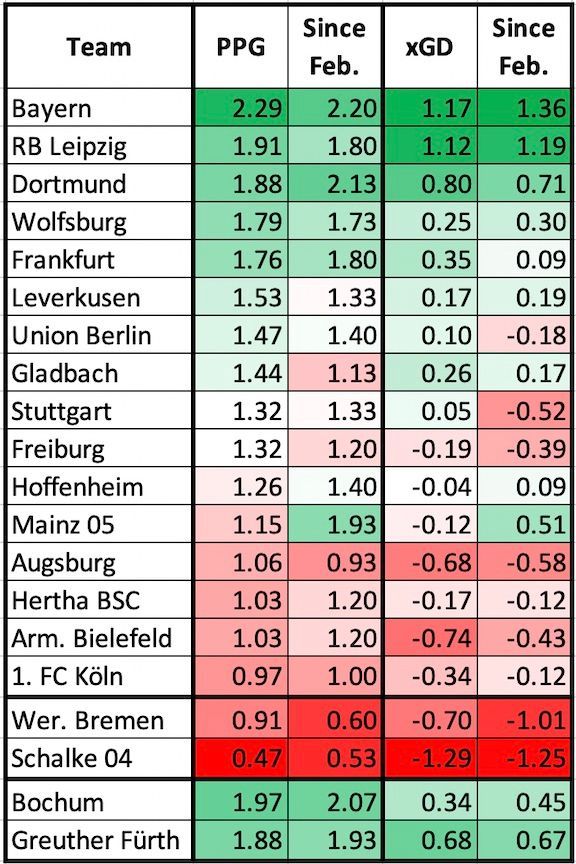
How does Nagelsmann change Bayern?
The 33-year-old is a coach who likes to tinker: according to StatsPerform, Nagelsmann’s Leipzig side used eight different formations over 34 league matches this season (most common: 3-4-2-1 10 times, 4-2-3-1 seven times and 3-1-4-2 seven times). He has expressed a preference for the three-man back line and this is a pretty good time for a defensive shift in Munich.
For one thing, Bayern allowed 44 goals in league play, their most since 1995-96. For another, longtime defenders David Alaba (Real Madrid) and Jerome Boateng (free agent) are gone, as is defensive midfield option Javi Martinez.
Bayern has already added an outstanding defender in Upamecano, but can it manage without temporary setbacks? Yes, the ninth straight Bundesliga title was won, but with their lowest point total — 78 — of the streak. Juventus can serve as a warning: Having (a) won a ninth straight title with a low point total, the Italian club (b) brought in a young(ish) manager who tried to change the identity, only to (c) see their title streak end.
Are Bayern in danger? Or does the presence of stalwarts like Joshua Kimmich, Robert Lewandowski, Thomas Muller, Leon Goretzka, as well as brilliant wings, insulate them from a serious challenge?
1:31
Jurgen Klinsmann says Robert Lewandowski has earned his place alongside Gerd Muller in Bundesliga history.
One last dance (probably) for BVB and Haaland
Borussia Dortmund and Liverpool both sing “You Never Walk Alone,” they both once reversed their fortunes by hiring Jurgen Klopp, and they both needed a late-season charge to save a spot in the Champions League.
BVB won its last seven league matches — five by multiple goals — and also threw a Champions League scare into Manchester City before stomping RB Leipzig 4-1 to win the DFB-Pokal. From April 10 onward, Erling Haaland scored eight goals with two assists, while Jadon Sancho and veteran Marco Reus combined for 10 goals and 37 chances created. BVB looked like the team we waited to see all year.
Sancho could leave, but with Haaland evidently staying for another season (barring a desperate and massive transfer bid from a superpower) and other young players like Jude Bellingham and Gio Reyna coming into their own, can we expect more of a sustained level of play from Germany‘s second-best club? Will they quickly take to what new manager Marco Rose is attempting to deploy?
Who’s No. 4 when the coaching carousel stops spinning?
German clubs cannibalized themselves this season in the managerial department. In mid-February, Borussia Monchengladbach announced that Rose would be leaving for Dortmund at the end of the season, then lost seven straight matches in all competitions. In mid-April, Eintracht Frankfurt‘s Adi Hutter announced he would be replacing Rose at Gladbach, and Eintracht won only two of its final six matches, which, ironically, allowed Borussia Dortmund to steal fourth place. Eintracht then stole Wolfsburg’s Oliver Glasner. In late-April, Bayern reached an agreement with Nagelsmann, and RBL proceeded to win just one of its final five matches in all comps.
The presumptive top three German clubs (Bayern, BVB and RB Leipzig) will all have new managers, as will basically every primary fourth-place contender: Gladbach (Hutter), Wolfsburg (undetermined), Bayer Leverkusen (Young Boys’ Gerardo Seoane), Frankfurt (Glasner), etc. Never mind turnover on the pitch, what will this game of musical chairs do to the top of the table?
La Liga
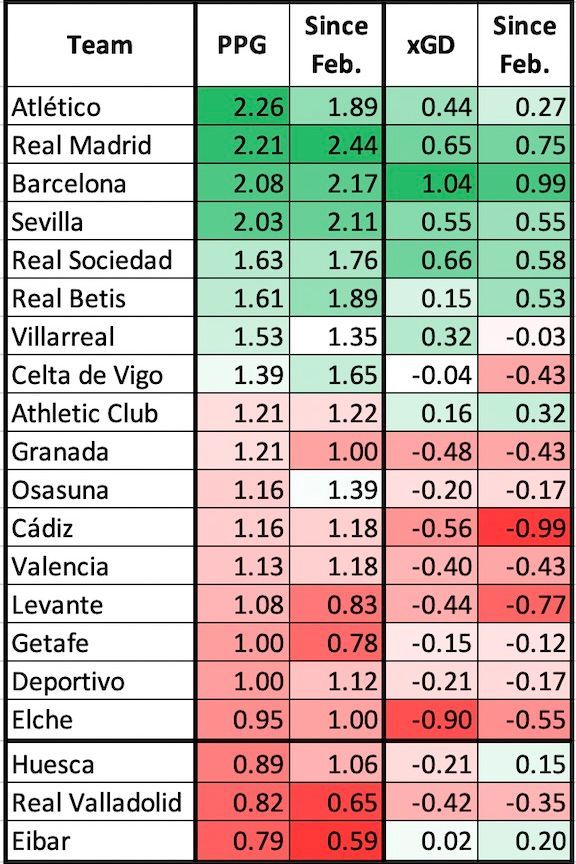
How do the Messi Chronicles end?
With Atletico due a drop-off, per the numbers, and Real Madrid in flux, it’s possible Barca will be the La Liga favorite next season whether or not they have Lionel Messi. But until we find out whether he’s staying or going, no other story line really matters. His contract expires on June 30, and while Barcelona president Joan Laporta is publicly expressing great confidence that Messi will remain at the Camp Nou, “Barca president confidently says X” has, of late, been a pretty good way of ensuring “X” doesn’t happen.
Barcelona is currently on a “spending” spree, nabbing free agents Wijnaldum, Sergio Aguero and Eric Garcia and attempting to pull in Memphis Depay as well as his Lyon contract expires at the end of June. They were quite easily the best team in the league on paper — their xG differential dwarfed that of everyone else — but a combination of random, devastating defensive breakdowns and some poor close-game fortune late in the year (they lost by one goal to Real Madrid, Granada and Celta Vigo and settled for draws against Atletico and Levante) rendered them third.
Barca probably would have been best served financially by moving on from Messi a year ago, and they certainly could have finished third with a Champions League round-of-16 exit without him. But they clearly don’t want to ever hit the reset button. Let’s see how this plays out.
1:45
Sid Lowe examines Lionel Messi’s future with Barcelona after Sergio Aguero’s comments at his Barcelona presentation on Monday.
Rejuvenating a tired Real Madrid
In terms of technical skill, Real Madrid still has more of it than just about anyone else. Luka Modric, Karim Benzema, Toni Kroos and Casemiro all remain masters of their craft. But they are also 35, 33, 31 and 29 years old, respectively, and all but Kroos logged at least 2,700 minutes in league play this year. Kroos, Nacho (31) and Lucas Vazquez (29) all logged at least 1,800, too; of the 21 players who put in at least 500 minutes, only four are younger than 25.
Even while evidently allowing 35-year-old Sergio Ramos to depart, this is an old team getting older. It will take multiple seasons to renovate the roster, and Real Madrid doesn’t appear to have quite as much money lying around as usual. It will still take some huge swings in the next couple of offseasons — at Kylian Mbappe, at Haaland, etc. — but this rebuild might take a while, and even with a huge addition this offseason it’s unclear how good Los Blancos might be in the interim.
1:17
Alejandro Moreno says Luis Suarez’s late-season heroics were crucial to Atletico lifting the La Liga trophy.
What’s the next step in Atletico’s semi-evolution?
Atletico won each of its last three matches to fend off Real Madrid by two points and take a second league title under Diego Simeone, who will forever be known as the greatest “4-4-2 and a sturdy defense” coach of the era, even if he has slowly attempted to evolve, at least slightly.
-
The 4-4-2 became more of a 3-1-4-2 or 3-4-2-1 at times this season.
-
Atleti made far more of an effort to possess the ball and control the field — when tied, their possession rate was 56% this season as compared to 51% in 2013-14, their last title run.
-
With recent additions like Luis Suarez (21 goals and 27 chances created this season) and 2020’s record-signing Joao Felix, the team has spent a lot on its attack and has shown more ability to charge forward when it needs to: The scoring margin (per 90 possessions) when behind this season was +1.38 compared to +0.25 in 2013-14.
This is still Atleti, though, which means allowing the fewest goals in the league with xG eraser Jan Oblak between the posts, and locking leads down as well as anyone. With both Barca and Real Madrid undergoing multiyear rebuilds, can Atleti continue figuring out ways to contend and modernize while maintaining Simeone’s longtime values? What moves does it make in an attempt to do so?
Serie A
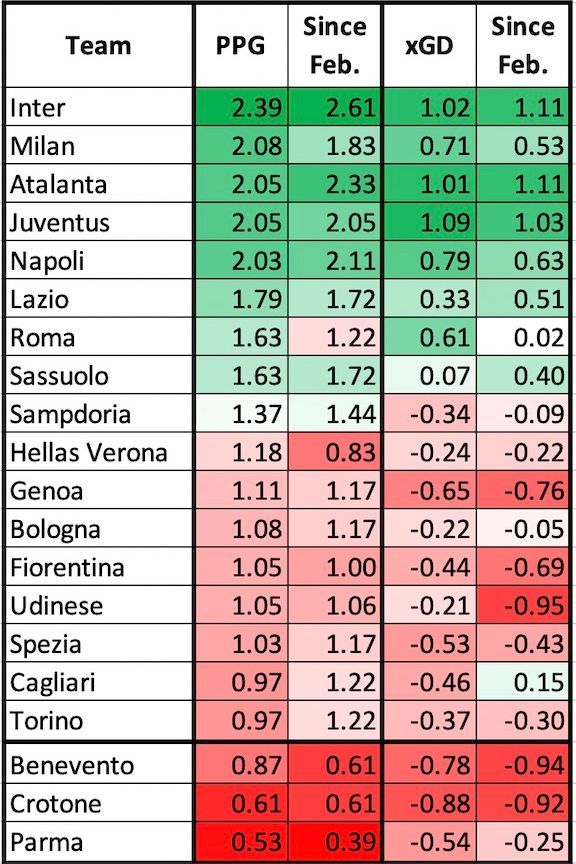
Juve runs it back with Allegri
Massimiliano Allegri is one of soccer’s most accomplished managers. He led Milan to its last Serie A title in 2011, then moved to Juventus and won five straight. In charge of the most talented teams in Italy, he pulled off a solid balance between attack and forever-sturdy defense — Juve allowed just 0.7 goals per match under him — but were still crafty enough to reach the 2015 and 2017 Champions League finals, outscoring Real Madrid in the 2015 semifinals and Barcelona in the quarterfinals two years later.
When they failed to get over the hump in either season — they lost 3-1 to Barcelona in the 2015 final and 4-1 to Real Madrid in 2017 — the club collectively lost its damn mind. Juve fired Allegri in 2019 after he merely won two more league titles, but lost twice in the Champions League quarterfinals.
In need of an influx of youth, a truckload of money was spent on 33-year-old Cristiano Ronaldo. On the bench, first Maurizio Sarri was hired (he lasted one season), then rookie manager Andrea Pirlo came in (ditto). What followed was twice failing to advance out of the Champions League Round of 16, and in 2021, the nine-year Scudetto streak ended.
Allegri is back and takes over a team that couldn’t decide whether it was in a youth movement or not — midfield, yes, attack and defense, no — and has plenty of financial issues. But it also had the best xG differential in the league and averaged an unsustainably bad 1.3 points per game in matches decided by zero or one goals (Inter averaged 1.9.)
Juve is in a rebuild, but is not. It is modernizing, but is not. Either way, Allegri and Co. probably start next season as league favorites.
0:56
Julien Laurens warns that returning managers aren’t always successful as Massimiliano Allegri replaces Andrea Pirlo at Juventus.
Which contenders keep their teams together?
Inter was a brilliant team this season, totally deserving of the title even if it also benefited from Juve’s close-game misfortune. If it could keep the roster together, it could contend for league crowns and, potentially, deep Champions League runs for years to come. But financial issues will prevent that from happening. Conte left because he didn’t want to take part in a sell-off, and the primary question is how many players will have to leave for the club to make ends meet.
Juve aside, however, it’s unclear who might be able to take advantage. Neither Napoli nor Roma will be making Champions League money this coming year, and no one in Italy is of particularly sound financial health. Milan does have less debt than others, and Gian Piero Gasperini’s always-attacking Atalanta isn’t as dependent on expensive talent, but there’s at least a chance that if stalwarts like Romelu Lukaku remain in place, Inter could still contend. First, we have to see who remains on which rosters.
Can Atalanta take this ride further?
For two straight seasons, Atalanta has posted excellent overall stats — first in goals scored, third in xG differential, first by a mile in watchability — and just qualified for their third straight go-round in the Champions League. But for all that entertainment, failure to maintain focus in league play during the Champions League group stages has been an issue.
In 2019-20, Atalanta was 11 points back of Inter and Juve in mid-December, as group stages were ending, before recording the most points in the league. This past season, it was 12 points off the pace in mid-December before averaging 2.2 points per game.
Gasperini’s squad is on the older side — six of the nine players with 1,800+ league minutes are 28 or older — but if they can keep the squad mostly intact and keep their focus in all competitions in October and November, they could challenge for their first-ever domestic title. Will that ever happen? Do they have the depth for that?
Ligue 1
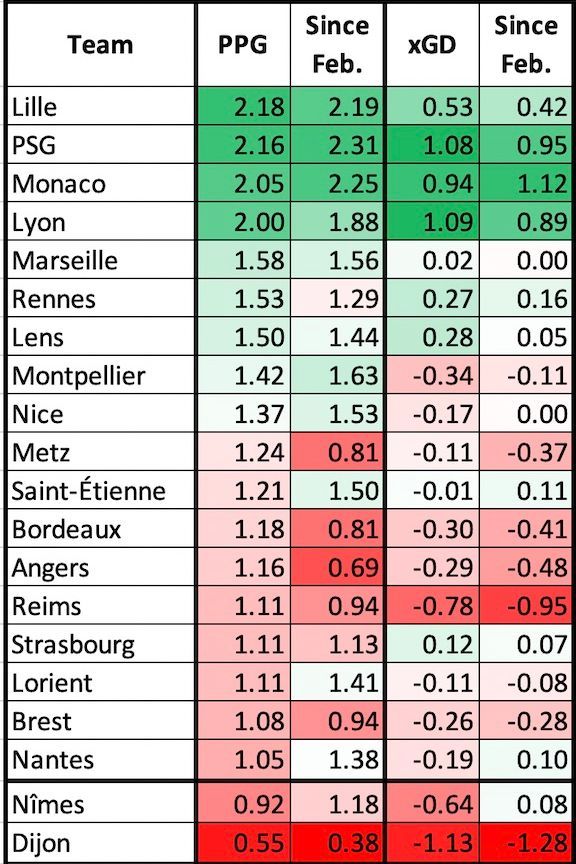
PSG’s mini-crisis
It doesn’t take too much effort to paint PSG’s Ligue 1 loss as simple, random misfortune. The team with all the financial advantages couldn’t overcome the ill-timed absences of stars: Kylian Mbappe missed seven matches (plus the second leg of the Champions League semifinals), Neymar missed 20 and, for that matter, no-one on the team played more than 31 of 38 league matches
There was also some dreadful luck in close games. Twenty of PSG’s 26 wins came by multiple goals, but just 22 points came from 17 zero- or one-goal matches (six wins, seven losses, four draws) while Lille pulled 47 from 26 (12 wins, three losses, 11 draws). It probably doesn’t take a math degree to realize what a difference that made in a one-point race.
Still, watching PSG in 2020-21, it was easy to have a specific thought lingering in the back of your head: “Shouldn’t this team be… more talented than this?” Mbappe and Neymar are almost guaranteed match-up advantages when they play, but who else on the team can say that, especially in a Champions League setting?
Angel Di Maria can still take over a match and players like Marquinhos and Marco Verratti were excellent in the Champions League. But Mbappe might be leaving for Real Madrid either this offseason or next, Neymar will turn 30 this coming season, and Di Maria (34) and stalwart midfielder Ander Herrera (31) are both already on the wrong side of the 3-0.
PSG is richer than almost any club on the planet, but will need an upgrade in several positions. What do they address first? What happens with Mbappe, their star and one of the five or so best players in the world? And who manages the club if a potentially unsettled Mauricio Pochettino is wooed away?
1:33
Gab Marcotti reacts to Lille securing the Ligue 1 title by a single point over French giant PSG.
Lille and the price of success
Ligue 1 consistently fields some of the best young talent in the sport, then watches as said talent is plucked away to other leagues. It assures solvency, but it also makes it difficult to challenge PSG in back-to-back seasons.
Lille’s title run was stirring and brilliant to watch, but now comes the price of success. Goalkeeper Mike Maignan has already joined Milan, and some of the team’s best young players — forward Jonathan David (21), defender Sven Botman (21), midfielder Boubakary Soumare (22) — have been the subject of high-profile transfer rumors. Can Les Dogues hold onto enough talent to put forward a good product in next season’s Champions League? And who might they be able to bring in in return?
Can Monaco keep its core together?
The title race went down to the wire between Lille and PSG, but only because another club got off to a poor start. Over the final 23 matches of the season, Monaco generated 55 points to Lille’s and PSG’s 51. It stretched opponents out of position, generated tons of high-quality chances — typically converted by either Wissam Ben Yedder or new addition Kevin Volland — and generally played the possession game well enough to keep opponents pinned on the wrong side of the pitch.
While Ben Yedder (30) and Volland (28) are either approaching or past the bend on the aging curve, a lot of this year’s minutes went to a thrilling young core of midfielders Aurelien Tchouameni (21), Youssouf Fofana (22) and Sofiane Diop (20) and defenders Benoit Badiashile (20), Caio Henrique (23) and Axel Disasi (23). If most of this roster remains in place for next season, this could be the team that most directly challenges PSG in 2021-22.
